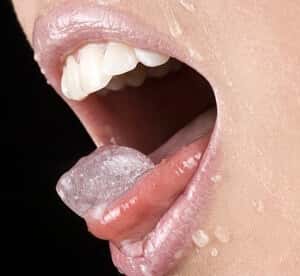
Ice cravings can, like the tip of an iceberg, signal a bigger problem. It may take some sleuthing, though. Many people with uncontrollable ice craving may have no idea that they need to be tested for nutritional deficiencies. One reader’s story shows why:
Ice Craving and Celiac Disease:
Q. My wife developed an intense ice craving. She crunched ice relentlessly at home and even when we ate out.
As it turned out, she was seriously anemic and osteoporotic as well. After almost four years of iron pills and blood infusions, a biopsy of her small intestines revealed celiac disease.
This was in the days before diagnostic blood tests and general awareness of gluten intolerance. Any strong change in food or drink preferences or eating behavior should be carefully checked out. You have written about ice cravings quite a lot but why haven’t you mentioned celiac disease as a potential causative factor?
Celiac Disease Can Cause Nutritional Deficiencies:
A. Thank you so much for sharing your wife’s story. A craving for non-food substances such as ice, cornstarch or clay is called pica.
Anemia brought on by iron deficiency can trigger this condition. As you correctly point out, anemia can be caused by celiac disease. This autoimmune disorder can damage the lining of the small intestine when susceptible people consume gluten from wheat, barley or rye.
The resulting inflammation and damage keeps the lining of the intestine from doing its job properly. It can’t absorb nutrients like iron or other minerals such as calcium, magnesium or zinc. Vitamin absorption may also be impaired.
People with unexplained anemia and ice cravings should be tested for celiac disease. (There is a case report about a 5-year-old child eating rocks in Gastroenterology and Hepatology from Bed to Bench, Winter 2017. Another case report involved a youngster eating sponges, published in Acta Paediatrica, Dec. 2007. Both of these children turned out to have celiac disease.)
We suspect that ice craving is far more common, especially in adults. People with this problem should also be checked for other nutritional deficiencies beyond iron deficiency and anemia.
Learn More:
You can listen to our interviews with experts on celiac disease: Dr. Peter H. R. Green, Director of the Celiac Disease Center at Columbia University; and Dr. Alessio Fasano, Director of the Center for Celiac Research and Division Chief of the Department of Pediatric Gastroenterology and Nutrition at Massachusetts General Hospital for Children.

